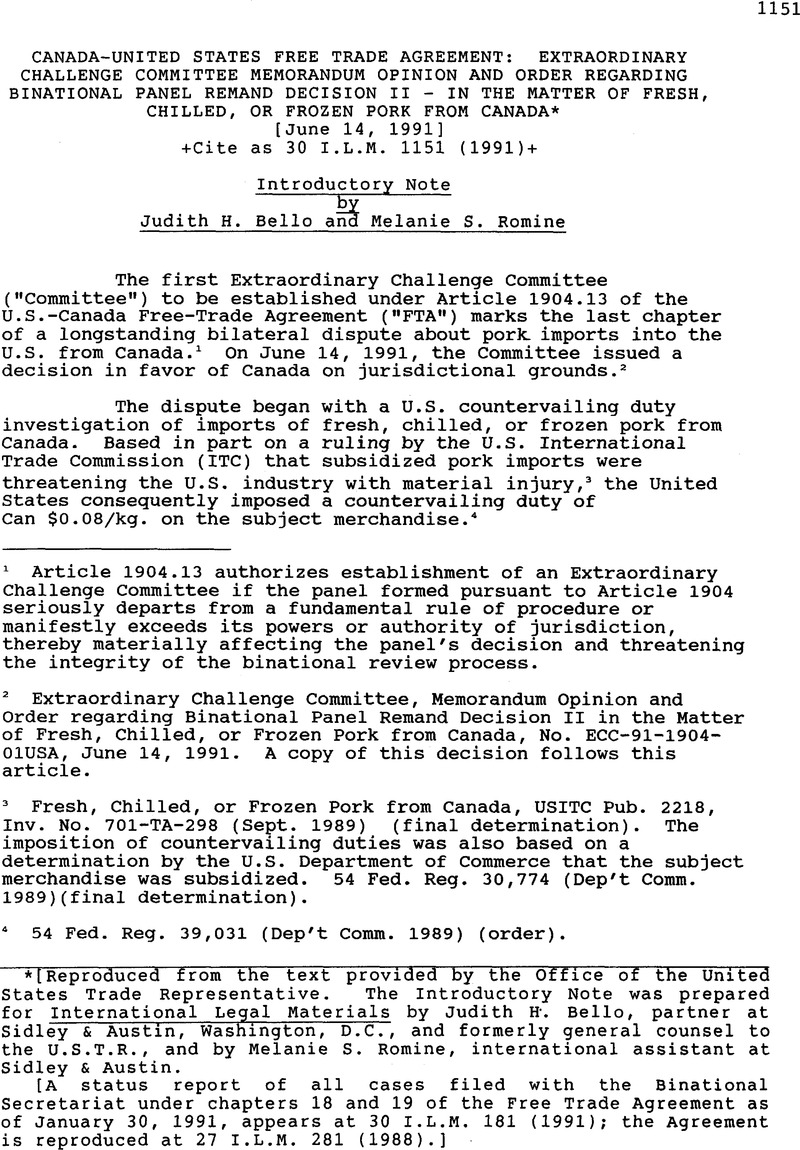No CrossRef data available.
Published online by Cambridge University Press: 27 February 2017

* [Reproduced from the text provided by the Office of the United States Trade Representative. The Introductory Note was prepared for International Legal Materials by Judith H-. Bello, partner at Sidley Austin, Washington, D.C., and formerly general counsel to the U.S.T.R., and by Melanie S. Romine, international assistant at Sidley Austin.]
[A status report of all cases filed with the Binational Secretariat under chapters 18 and 19 of the Free Trade Agreement as of January 30, 1991, appears at 30 I.L.M. 181 (1991); the Agreement is reproduced at 27 I.L.M. 281 (1988).]
1 Article 1904.13 authorizes establishment of an Extraordinary Challenge Committee if the panel formed pursuant to Article 1904 seriously departs from a fundamental rule of procedure or manifestly exceeds its powers or authority of jurisdiction, thereby materially affecting the panel's decision and threatening the integrity of the binational review process.
2 Extraordinary Challenge Committee, Memorandum Opinion and Order regarding binational Panel Remand Decision II in the Matter of Fresh, Chilled, or Frozen Pork from Canada, No. ECC911904 01USA, June 14, 1991. A copy of this decision follows this article.
3 Fresh, Chilled, or Frozen Pork from Canada, USITC Pub. 2218, Inv. No. 701TA298 (Sept. 1989) (final determination). The imposition of countervailing duties was also based on a determination by the U.S. Department of Commerce that the subject merchandise was subsidized. 54 Fed. Reg. 30,774 (Dep't Comm. 1989)(final determination).
4 54 Fed. Reg. 39,031 (Dep't Comm. 1989) (order).
5 54 Fed. Reg. 43,192 (Binational Secretariat 1989).
6 55 Fed. Reg. 38,375 (Binational Secretariat 1990).
7 55 Fed. Reg. 39,073 (ITC 1990). In its notice of remand proceedings, the ITC claimed that it needed to reopen the record and collect information on three new aspects of the investigation.
8 Fresh, Chilled, or Frozen Pork from Canada, USITC Pub. 2330, Inv. No. 701TA298 (Oct. 1990) (final remand).
9 Binational Panel Review, Memorandum Opinion and Order Regarding ITC's Determination on Remand in the Matter of Fresh, Chilled, or Frozen Pork from Canada, No. USA89190411, Jan. 22, 1991.
10 ITC's second remand determination included language such as: “To support their counterintuitive, counterfactual, and illogical, but legally binding, conclusion, the Panel.” Fresh, Chilled, or Frozen Pork from Canada, USITC Pub. 2362, Inv. No. 701TA298 at 15 (Feb. 1991) (finalsecond remand).
11 Id at 3. 12
12 Daily Executive Rep., April 11, 1991, at A14.
1 In the Federal Register notice, the Commission “reopen[ed] the record to gather information on three narrow aspects of its investigation,” covering only the period of the Commission's investigation, concerning “(1) Canadian production, imports, exports, and apparent consumption; (2) the production capacity and utilization of the Fletcher's Fine Foods pork packing plant in Red Deer, Alberta and of the Canadian pork packing industry as a whole; and (3) Japanese imports of pork from Taiwan and Canada.“ 55 Fed. Reg. 39,073.
2 Two Commissioners resigned after the initial final determination on September 13, 1989 and had not been replaced.
3 Acting Chairman Brunsdale reaffirmed her prior negative determination. Commissioners Rohr and Newquist reversed their previous affirmative determination of threat of injury; however, both recorded their disagreement with the conclusions set out in Panel Remand Decision II, stating that the second panel decision “violate[d] fundamental principles” of the FTA and “contain[ed] egregious errors under U.S. law.” Views on Second Remand at 5.
4 Several parties discussed the similar standard of review applicable to extraordinary challenge committees under the FTA and ad hoc committees under the Convention on the Settlement of Investment Disputes between States and Nationals of Other States (“ICSID“). While ICSID ad hoc committees appear to have standards quite similar to those set out under FTA Article 1904.13(a), extraordinary challenge committees have two additional standards under FTA Article 1904.13(b) relating to “materiality” and “threat to the integrity of the binational panel review process,” effectively making comparisons between the FTA and ICSID of somewhat limited persuasive value.
5 In its second remand decision, the Panel instructed the ITC to limit the Record, including the information gathered on remand, to the “three narrow aspects” specifically mentioned in the September 24,1990, Federal Register notice, “covering only the period of the Commission's original period of investigation, and dealing with no legal or economic argument other than those raised in the Panel's Remand Order.“ Panel Remand Decision II at 38.
6 Federal Communications Comm'n v. Pottsville Broadcasting CO.. 309 U.S. 134 (1940).
7 55 Fed. Reg. 20,812 (May 21, 1990) (Dept. Commerce preliminary finding).